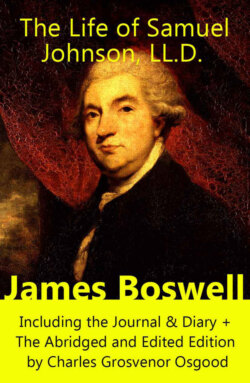Читать книгу The Life of Samuel Johnson, LL.D. - James Boswell - Страница 182
На сайте Литреса книга снята с продажи.
BOSWELL.
Оглавление[332] ‘I have some reason to think that at his first coming to town he frequented Slaughter’s coffee-house with a view to acquire a habit of speaking French, but he never could attain to it. Lockman used the same method and succeeded, as Johnson himself once told me.’ Hawkins’s Johnson, p. 516. Lockman is l’ilustre Lockman mentioned post, 1780, in Mr. Langton’s Collection. It was at ‘Old Slaughter’s Coffee-house, when a number of foreigners were talking loud about little matters, that Johnson one evening said, “Does not this confirm old Meynell’s observation, For anything I see, foreigners are fools“?’ post, ib.
[333] He had read Petrarch ‘when but a boy;’ ante, p. 57.
[334] Horace Walpole, writing of the year 1770, about libels, says: ‘Their excess was shocking, and in nothing more condemnable than in the dangers they brought on the liberty of the press.’ This evil was chiefly due to ‘the spirit of the Court, which aimed at despotism, and the daring attempts of Lord Mansfield to stifle the liberty of the press. His innovations had given such an alarm that scarce a jury would find the rankest satire libellous.’ Memoirs of the Reign of George III, iv. 167. Smollett in Humphrey Clinker (published in 1771) makes Mr. Bramble write, in his letter of June 2: ‘The public papers are become the infamous vehicles of the most cruel and perfidious defamation; every rancorous knave—every desperate incendiary, that can afford to spend half-a-crown or three shillings, may skulk behind the press of a newsmonger, and have a stab at the first character in the kingdom, without running the least hazard of detection or punishment.’ The scribblers who had of late shewn their petulance were not always obscure. Such scurrilous but humorous pieces as Probationary Odes for the Laureateship, The Rolliad, and Royal Recollections, which were all published while Boswell was writing The Life of Johnson, were written, there can be little doubt, by men of position. In the first of the three (p. 27) Boswell is ridiculed. He is made to say:—‘I know Mulgrave is a bit of a poet as well as myself; for I dined in company once where he dined that very day twelvemonth.’ This evil of libelling had extended to America. Benjamin Franklin (Memoirs, i. 148), writing in 1784, says that ‘libelling and personal abuse have of late years become so disgraceful to our country. Many of our printers make no scruple of gratifying the malice of individuals by false accusations of the fairest characters.’
[335] Boswell perhaps refers to a book published in 1758, called The Case of Authors by Profession. Gent. Mag. xxviii. 130. Guthrie applies the term to himself in the letter below.
[336] How much poetry he wrote, I know not: but he informed me, that he was the authour of the beautiful little piece, The Eagle and Robin Redbreast, in the collection of poems entitled The Union, though it is there said to be written by Archibald Scott, before the year 1600. BOSWELL. Mr. P. Cunningham has seen a letter of Jos. Warton’s which states that this poem was written by his brother Tom, who edited the volume. CROKER.
[337] Dr. A. Carlyle in his Autobiography (p. 191) describes a curious scene that he witnessed in the British Coffee-house. A Captain Cheap ‘was employed by Lord Anson to look out for a proper person to write his voyage. Cheap had a predilection for his countrymen, and having heard of Guthrie, he had come down to the coffee-house to inquire about him. Not long after Cheap had sat down, Guthrie arrived, dressed in laced clothes, and talking loud to everybody, and soon fell awrangling with a gentleman about tragedy and comedy and the unities, &c., and laid down the law of the drama in a peremptory manner, supporting his arguments with cursing and swearing. I saw Cheap was astonished, when, going to the bar, he asked who this was, and finding it was Guthrie he paid his coffee and slunk off in silence.’ Guthrie’s meanness is shown by the following letter in D’Israeli’s Calamities of Authors, i. 5:—
‘June 3, 1762.
‘My Lord,
‘In the year 1745-6 Mr. Pelham, then First Lord of the Treasury, acquainted me that it was his Majesty’s pleasure I should receive till better provided for, which never has happened, 200£. a year, to be paid by him and his successors in the Treasury. I was satisfied with the august name made use of, and the appointment has been regularly and quarterly paid me ever since. I have been equally punctual in doing the Government all the services that fell within my abilities or sphere of life, especially in those critical situations that call for unanimity in the service of the Crown.
‘Your Lordship may possibly now suspect that I am an Author by profession; you are not deceived; and will be less so, if you believe that I am disposed to serve his Majesty under your Lordship’s future patronage and protection with greater zeal, if possible, than ever.
‘I have the honour to be
‘My Lord &c.
